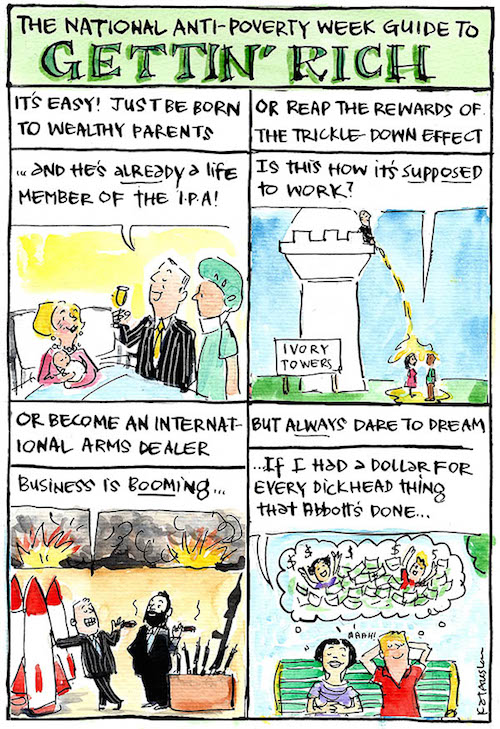A new report has today found that more than a million Australians are living with “chronic or persistent poverty or deprivation” while the Australian Council of Trade Unions has warned of a growing ‘working poor’.
“An estimated four to six per cent of our society experiences chronic or persistent poverty or deprivation,” the report from the Committee for Economic Development of Australia (CEDA) and ANCIL Allen consulting said.
“This represents both a tragedy for the individuals concerned and a loss of economic potential for the nation.”
The report notes that while Australia does “have policies in place or in development to address disadvantage, it is not clear that we have recognised the need to address the deeper problem of long-term, persistent and chronic disadvantage”.
The Australian Greens spokesperson on Community Services, Rachel Siewart, labelled the findings a “national shame”.
“This is not a case of limited resources, it is a case of limited political will to address the issue by Government,” Siewart said.
“Last year more than ever the Government attacked social services, stripping back income support measures and social services, taking a hard line so called ‘tough love’ approach,” she said.
“Community and Aboriginal and Torres Strait Islanders services lost funding, the Government attempted to chuck people under 30 off income support for six months, the healthy welfare card is going full steam ahead whilst work for the dole is enforced.”
The report found that older people, the less educated, households with no employed members, certain geographical areas, Aboriginal Australia and those with chronic health problems are most likely to experience severe disadvantage.
Since poverty rates “increased modestly” over the 1980s after an initial level of around 11 per cent in 1982, they declined through the first half of the 1990s before rising again to almost 13 per cent by 2002, reached a peak in 2007-8 and then fell back slightly between then and 2011-12.
While the study stressed that income is only one factor in poverty, its release coincides with warnings from the Australian Council of Trade Unions (ACTU) of a growing “working poor”.
Employer groups have argued for a modest $5.70 weekly increase to the minimum wage, which is currently being reviewed by the Fair Work Ombudsman, which the ACTU dismisses as a real wage cut after inflation is taken in to account.
“Labour productivity is high, profits are up, CEO salaries are certainly going up, yet the share of the pie for workers is going down,” Secretary of the peak trade body Dave Oliver said.
“There are already signs that Australia is developing a working poor with financial stress, deprivation and poverty on the rise among low paid workers.”
He said the $27 increase to the minimum wage unions are barracking for would stimulate the economy to the tune of $3.1 billion and “is essential if Australia is to avoid creating an underclass of working poor”.

The ACTU noted that the reserve bank had kept interest rates steady and said an increase in consumer confidence is needed to boost jobs and economic growth, which a $27 wage hike to the 18.8 per cent of employees on the minimum wage would deliver.
“Retail trade grew to 8.7% annualised in February 2015,” the peak union body said, “showing employers can afford to increase minimum wages”.
The Australian Chamber of Commerce and Industry, however, maintained in its submission to the wage review that “the minimum wage function must not exacerbate the risk of unemployment for those most vulnerable in the labour market”.
“Participation in paid work is critical to maintaining adequate living standards and to prevent poverty and social exclusion,” the business lobby argued.
The ACCI submission painted a bleak picture of the labour market and broader economy, predicting that “Australia can expect challenging times ahead as labour demands shift and reallocation occurs”.
In contrast, the federal opposition noted that relative to comparable economies, Australia’s Labor markets and broader economy have remained strong in recent years, and made the case for a “decent minimum wage”.
“While the minimum wage has been increasing in real terms,” the submission noted, “it has been decreasing relative to median and average wages”.
“Twenty years ago the minimum wage was 63% of the median wage. Now it is 54 per cent.
“The decline is even starker relative to average wages: 52 per cent to 43 per cent over twenty years.”
The Labor party said that the “minimum wage bite” in Australia in the 10 years to 2013 is the largest in the OECD and predicted that “if the trend continues, Australia may be in the same position as countries where ‘working poor’ is a fair description of low income earners”.
CEDA’s report on entrenched poverty found that while Australia is “one of the richest [nations]in the world” and “the economy performed admirably during the Global Financial Crisis…the success of our economy has not translated well to moving people out of poverty and disadvantage”.
Relying on an Australian Council of Social Services benchmark, which put the poverty line at a disposable income of less than $400 per week for a single adult and $841 for a couple with two children, the report found that 13.9 per cent or the population, or 2.55 million Australians, “had an income below that necessary to acquire a socially acceptable standard of living”.
“As a rich and successful society, we can clearly do better, [as]others do,” the report said.
Donate To New Matilda
New Matilda is a small, independent media outlet. We survive through reader contributions, and never losing a lawsuit. If you got something from this article, giving something back helps us to continue speaking truth to power. Every little bit counts.



